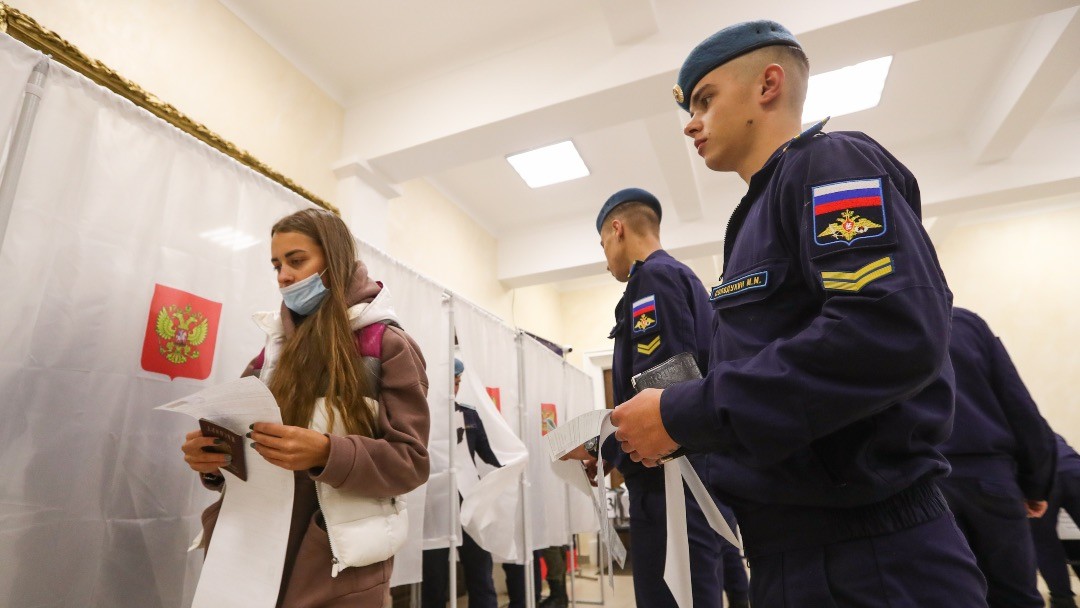Elections held across Russia from September 9 to 11, amid a teetering economy and a faltering war effort, will have given no succor to those who are hoping for political change in Russia. They will not, however, have given much solace to Vladimir Putin either.
As Russians went to the polls for the first time since Putin plunged the country into war in Ukraine, casting ballots for local and regional races in the absence of all but the most half-hearted opposition, the result was never destined to be meaningful. With few reliable signals about the level of political support for Putin, his regime, and his war, the weekend’s elections did however make one thing clear: whatever else Russians may be at the moment, they are not particularly excited.
Voters — in tightly controlled elections marked by significant degrees of manipulation and fraud — handed all of the governorships and regional parliaments at stake to the ruling United Russia party, along with the lion’s share of municipal races. Only one mayor, in the city of Neryungri, Yakutia (population 62,000), came from a different party (the loyal nationalist and misnamed Liberal Democratic Party of Russia.) In Moscow, where the democratic opposition has its largest support base, United Russia claimed more than 1,100 out of some 1,500 municipal council seats, while its allied My Neighborhood party added dozens more. In the Moscow district of Khamovniki, which in 2017 rejected every single United Russia candidate on the ballot, United Russia took 12 out of 15 seats on the district council.
Voters, of course, played only a partial role in determining the outcome. In a sweeping and damning report, the independent electoral rights organization Golos documented the degree to which the Kremlin had rigged them before the ballots had even been printed: jailing some opposition candidates (like Evgeny Roizman and Ilya Yashin) and barring others (like Yulia Galyamina) from running, and throttling candidates’ ability to campaign and journalists’ ability to cover the electoral process.
“The biggest problem with the 2022 elections,” Golos wrote, “was the full-scale assault on the remnants of free speech and free expression. In fact, at present, the majority of citizens have been deprived of the right to receive information on the most important political, socio-economic, cultural, and societal issues alternative to the official line, as well as to freely express their opinions.”
Removing almost all genuinely alternative candidates from the ballot effectively turned the vote into a referendum: any vote against United Russia – and even a decision not to vote at all – was for all intents and purposes a statement against the direction in which Putin is taking the country.
And so while the Kremlin might be happy with the results it declared, it might not be so satisfied with the lengths to which it had to go to declare them. Golos received some 2,354 reports of fraud on its hotline and online reporting system – up 16% from the last time these same elections were held. In particular, authorities appear to have taken advantage of the opacity of the electronic voting system and the difficulty of monitoring elections over three days of voting to boost turnout figures and increase the vote for Kremlin-friendly candidates. In Moscow, turnout “increased” from 15% in 2017 to 35% this time around, despite a marked lack of enthusiastic campaigning by any of the parties.
Even so, reports of interference abound. Golos noted frequent complaints of pressure on state employees to vote, while several voters were charged with “discrediting the army” for writing anti-war messages on their ballots – undermining any confidence that ballots were, in fact, secret. Taken together, then, the pressure and the fraud suggest that the elections were not altogether smooth sailing for the people responsible for delivering the numbers Putin likes to see.
While those may look like nuances in the broader story of a regime that appears firmly in control, they will nevertheless loom large in the Kremlin’s political imagination, as it gazes at more significant problems – and more consequential elections – coming down the pike. While there is evidence that the economic pain of sanctions and war is beginning to trickle down to ordinary Russian citizens, who are seeing furloughs and wage arrears despite the government’s best efforts, most economists believe that the worst is yet to come.
And the news of Ukraine’s successful counter-offensive in the country’s northeast came too late to have much effect on the vote, though there were signs it was already shifting the tenor of the public conversation in Russia.
This weekend’s uninspiring results, then, may reflect the best the Kremlin can hope for.
Sam Greene is Director for Democratic Resilience at the Center for European Policy Analysis (CEPA). Sam is also a Professor of Russian Politics at King’s College London.




